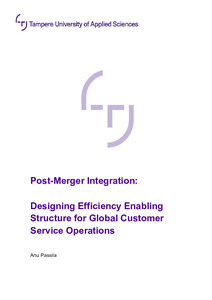Post-merger integration : designing efficiency enabling structure for global customer service operations
Passila, Anu (2023)
Passila, Anu
2023
All rights reserved. This publication is copyrighted. You may download, display and print it for Your own personal use. Commercial use is prohibited.
Julkaisun pysyvä osoite on
https://urn.fi/URN:NBN:fi:amk-2023103128251
https://urn.fi/URN:NBN:fi:amk-2023103128251
Tiivistelmä
This thesis examines how to design process-based efficiency enabling structure for integrating customer service units in post-merger integration environment through business process management and business process standardization methodologies.
The study was conducted as a case study for a global RFID company and its objective was to study the current processes in use for the units in question and activities and responsibilities of people managing and driving the processes to align and harmonize them to gain efficiency and structure.
The theoretical section explored business process management and business process standardization concepts, methods, and tools with value creation philosophy that could be applicable in the creation of conceptual framework and answering the objectives of the study.
Data were collected through 8 qualitative interviews with a focus group of 6 experts working within the processes managing and driving them to gain valuable insights and overall picture of the current situation.
The findings discovered the current status, similarities and differences of as-is processes, activities and responsibilities of the different units and analyzed the change and improvement needs. Change and improvement needs were categorized into themes and reflected against the conceptual framework to understand the maturity of the processes and revealing the possible obstacles for increasing efficiency and effectiveness of operations further.
In conclusion, recommendations were offered for designing efficiency enabling structure by defining the boundaries of the integrated process, removing non-value adding activities, aligning value adding activities and responsibilities accordance with the process. Incorporating process enablers to enable increasing their maturity to further increase the operational and customer focused efficiency was also seen valuable for which the process performers had favorable knowledge, skills, and behavior to drive further changes and improvement initiatives for audit, quality management and integration advancement purposes.
The study was conducted as a case study for a global RFID company and its objective was to study the current processes in use for the units in question and activities and responsibilities of people managing and driving the processes to align and harmonize them to gain efficiency and structure.
The theoretical section explored business process management and business process standardization concepts, methods, and tools with value creation philosophy that could be applicable in the creation of conceptual framework and answering the objectives of the study.
Data were collected through 8 qualitative interviews with a focus group of 6 experts working within the processes managing and driving them to gain valuable insights and overall picture of the current situation.
The findings discovered the current status, similarities and differences of as-is processes, activities and responsibilities of the different units and analyzed the change and improvement needs. Change and improvement needs were categorized into themes and reflected against the conceptual framework to understand the maturity of the processes and revealing the possible obstacles for increasing efficiency and effectiveness of operations further.
In conclusion, recommendations were offered for designing efficiency enabling structure by defining the boundaries of the integrated process, removing non-value adding activities, aligning value adding activities and responsibilities accordance with the process. Incorporating process enablers to enable increasing their maturity to further increase the operational and customer focused efficiency was also seen valuable for which the process performers had favorable knowledge, skills, and behavior to drive further changes and improvement initiatives for audit, quality management and integration advancement purposes.
